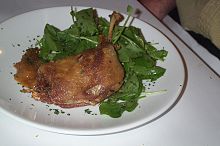Confit
Confit (from French confire , "to pick up , to boil down") is meat cooked in fat and preserved in this way .
The dish has its origins in the south of France for the use of the poultry meat used in the production of foie gras . Traditionally, the meat of ducks ( confit de canard ), geese ( confit d'oie ) or pigs is used, which is then cooked in its own fat. Usually the meat is lightly cured beforehand .
To make confit, the meat pieces are first rubbed with salt or placed in brine and left to rest for a day. The meat that may then be seared is then covered with its own fat ( lard ) and cooked on a mild heat for one to several hours. Depending on the recipe, spices such as peppercorns , bay leaves , etc. are added. The finished confit is traditionally stored in earthenware pots, with fat and meat being alternately placed in the vessels and everything must be covered with a thick layer of fat so that the meat does not spoil. The typical aroma develops after about two to three weeks of cool storage; Confit can be kept for several months. The very tender meat can be eaten immediately or fried until crispy first.
Rillettes and Pottsuse are made in a very similar way from finely chopped meat that is used as a spread . The underlying process ( confectioning ) is also used to prepare other types of meat, not only for preservation, but also as a gentle braising method - then the lard can be replaced with vegetable oil if the dish is no longer to be stored. Today, spicy side dishes such as onions or tomatoes , slowly braised with vinegar and other ingredients, are sometimes called confit.
